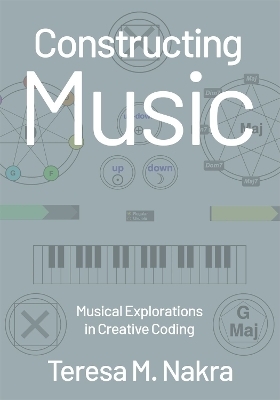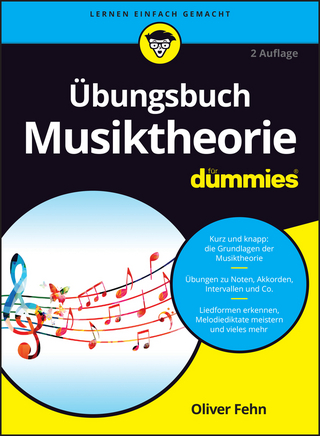
Constructing Music
Musical Explorations in Creative Coding
Seiten
2024
Oxford University Press Inc (Verlag)
978-0-19-766920-4 (ISBN)
Oxford University Press Inc (Verlag)
978-0-19-766920-4 (ISBN)
Why does music exert such a strong pull on us? How does it work? Traditional courses in music fundamentals give students a basic understanding of the building blocks of music and how to put them together to make a result that produces an intended effect. Constructing Music: Musical Explorations in Creative Coding takes students a step further: through a series of step-by-step tutorials and lessons, author Teresa M. Nakra presents a new method for teaching music fundamentals that foregrounds creative coding practices and builds upon the computing skills that today's students already possess. By encouraging experimentation with computer code, this book gives students tools to actively investigate, simulate, and engage with the structure of music, ultimately leading to greater understanding about the processes that underlie music's power over us.
Designed to support computer-based learning in tonal harmony, musicianship, and music theory, Constructing Music avoids the lens of Western music notation and instead explains music content through analogies with toy bricks and references ideas from creative technology, engineering, and design. Students also engage directly with the components of musical structure using editable short code "patches" developed in Max, a visual coding environment for interactive music, audio, and media. Dozens of patches accompany the book and allow readers to play with the building blocks of sound, reinforcing each topic by tinkering, modifying, and creating their own versions of the material. Each chapter explains core music theory concepts in detail and supports every description through code simulations, progressing through the topics with increasing complexity. In the final chapter, Nakra explores the questions and theories that emerge from the lessons, considering the role of music as a proto-form of AI and its impacts on emotion, wellness, and creativity.
Designed to support computer-based learning in tonal harmony, musicianship, and music theory, Constructing Music avoids the lens of Western music notation and instead explains music content through analogies with toy bricks and references ideas from creative technology, engineering, and design. Students also engage directly with the components of musical structure using editable short code "patches" developed in Max, a visual coding environment for interactive music, audio, and media. Dozens of patches accompany the book and allow readers to play with the building blocks of sound, reinforcing each topic by tinkering, modifying, and creating their own versions of the material. Each chapter explains core music theory concepts in detail and supports every description through code simulations, progressing through the topics with increasing complexity. In the final chapter, Nakra explores the questions and theories that emerge from the lessons, considering the role of music as a proto-form of AI and its impacts on emotion, wellness, and creativity.
Teresa M. Nakra is Professor of Music, Design, and Creative Technology at The College of New Jersey, where she coordinates Music Technology activities. She is a recipient of the Doris Cohen Levi Prize, the David McCord Prize, the Michael C. Rockefeller Memorial Fellowship, and research fellowships from IBM, Motorola, and Interval Research Corporation. Nakra has designed interactive music systems for museums, music festivals, and concert halls across the United States, Europe, and Japan.
Dedication
Foreword
Preface
Acknowledgements
About the Companion Website
Introduction
1 Tutorials
2 Building Blocks
3 Pitch-based Structures
4 Time-based Structures
5 Finer Granularities
6 Reflections
Glossary
Index
| Erscheinungsdatum | 24.01.2024 |
|---|---|
| Zusatzinfo | 46 b/w figures, 2 tables |
| Verlagsort | New York |
| Sprache | englisch |
| Maße | 185 x 244 mm |
| Gewicht | 431 g |
| Themenwelt | Kunst / Musik / Theater ► Musik |
| Technik | |
| ISBN-10 | 0-19-766920-4 / 0197669204 |
| ISBN-13 | 978-0-19-766920-4 / 9780197669204 |
| Zustand | Neuware |
| Haben Sie eine Frage zum Produkt? |
Mehr entdecken
aus dem Bereich
aus dem Bereich


